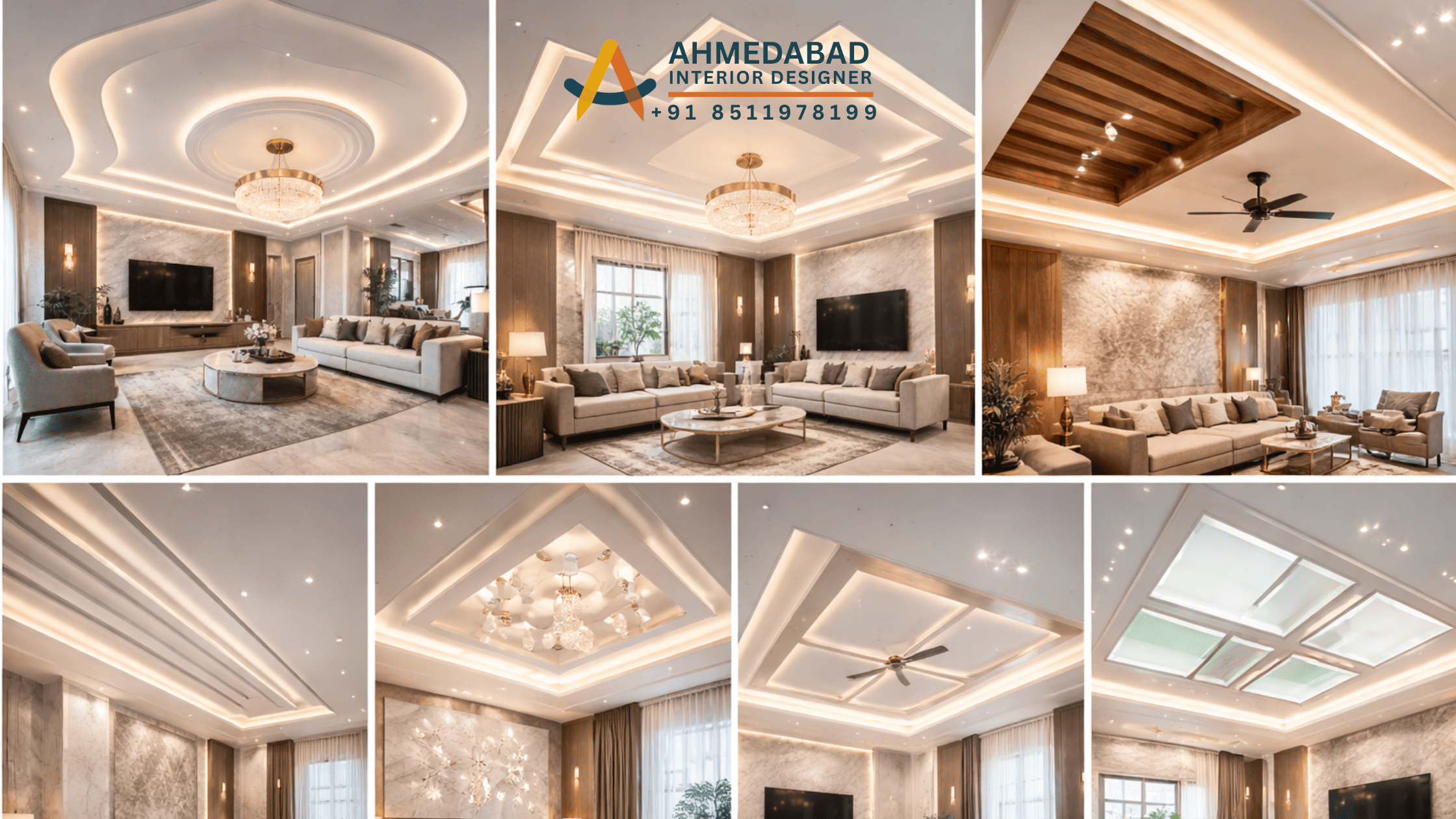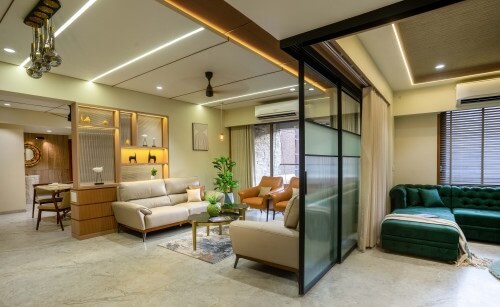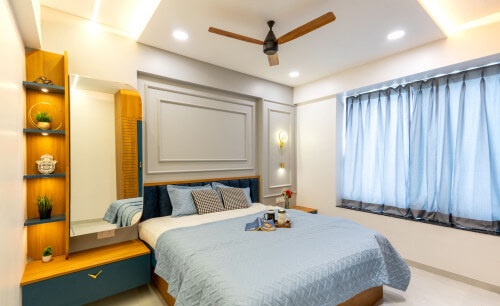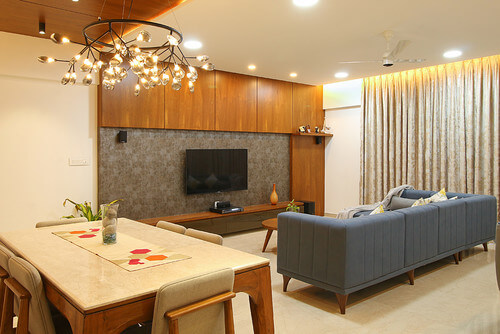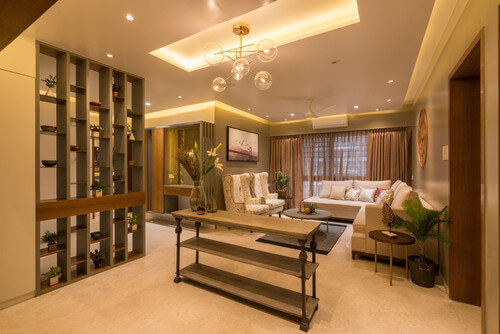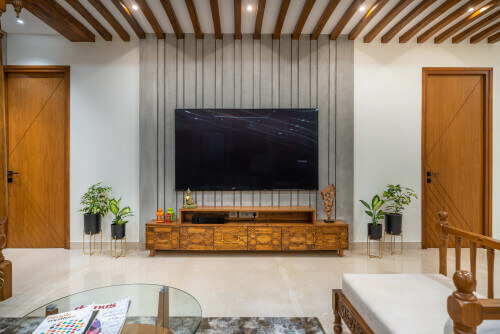Vastu Shastra, the ancient Indian science of architecture, is more than just design — it’s about creating harmony between your home and the natural elements. Rooted in centuries-old wisdom, Vastu connects space, direction, light, and energy to help you live a more peaceful and prosperous life. In today’s fast-paced world, many homeowners are turning to Vastu Shastra tips for home to invite positive energy, good health, and financial stability into their living spaces.
A well-planned Vastu for home layout ensures that every room — from the entrance to the bedroom — channels the right kind of energy flow. The balance of the five elements (earth, water, fire, air, and space) directly influences your relationships, mindset, and overall well-being. Whether you’re building a new house or renovating an apartment, following this home Vastu guide can transform your surroundings into a space filled with peace, prosperity, and positivity.
What Is Vastu Shastra and Why It Matters?
Vastu Shastra is an ancient Indian architectural science that blends art, design, and energy balance to create harmonious living spaces. Derived from the Sanskrit words “Vastu” (dwelling) and “Shastra” (science), it focuses on aligning your home with nature’s five essential elements — earth, water, fire, air, and space. Each element represents a force that influences your physical and emotional well-being, and the goal of Vastu is to maintain a healthy balance among them.
The principles of Vastu Shastra for home revolve around directions, layout, and energy flow. According to traditional belief, each direction — North, South, East, and West — is governed by a particular energy field. For example, the East direction is associated with sunlight and vitality, while the North is linked to prosperity and new opportunities. When your home design respects these directional energies, it promotes harmony, health, and abundance.
Even in modern architecture, the importance of Vastu Shastra remains strong. Many architects and interior designers now integrate Vastu principles into contemporary layouts to ensure homes feel balanced, peaceful, and energetically positive — combining traditional wisdom with modern lifestyle needs.
Basic Principles of Vastu Shastra for Home
The foundation of a positive and peaceful home begins with following the basic principles of Vastu Shastra. These ancient guidelines focus on creating harmony between natural elements, directions, and spatial arrangements — helping you attract health, happiness, and prosperity. Whether you’re building a new house or planning a home renovation, these Vastu tips for home can make a big difference in the energy flow and overall well-being of your space.
1. Shape and Structure of Rooms
According to Vastu Shastra for home design, rooms should ideally be square or rectangular. Balanced shapes ensure smooth energy circulation, while irregular or circular layouts can cause imbalance and restlessness in the household.
2. Lighting and Airflow
Good ventilation and natural light are essential in home Vastu planning. Make sure every room receives adequate sunlight and fresh air. Clean, bright, and airy spaces invite positive energy and reduce stress, making your home feel vibrant and uplifting.
3. Furniture Placement
Heavy furniture items such as beds, wardrobes, and cupboards should be placed in the Southwest direction, known for stability and strength. Keep pathways clear and avoid clutter to ensure unhindered energy movement throughout the home.
4. Water Elements for Calmness
Adding Vastu water elements like aquariums, indoor fountains, or even paintings featuring water can promote peace, emotional balance, and prosperity. Place these in the Northeast direction, considered highly auspicious for water-related elements.
✅ Pro Tip:
Combine these Vastu Shastra home principles with modern design for a balanced, functional, and spiritually aligned space. Even small changes — like rearranging furniture or improving natural light — can transform the energy of your home.
Vastu Tips for Main Entrance
The main entrance of your home is considered the gateway of energy according to Vastu Shastra. It is the first point through which positive energy, prosperity, and happiness enter your living space. A well-aligned entrance not only improves the aesthetic appeal of your home but also ensures that good vibrations flow smoothly into every corner.
1. Ideal Direction for Main Door
The North, East, or Northeast direction is highly recommended for the main door. These directions attract wealth, success, and positive energy into the home. If your home faces any other direction, you can still balance energy by keeping the entrance clean, well-lit, and clutter-free.
2. Cleanliness and Organization
Clutter near the entrance blocks the flow of energy. Avoid storing shoes, bins, or unused items at the doorway. A well-maintained entrance instantly feels welcoming and encourages positivity throughout the home.
3. Door Design and Materials
Choose a sturdy and aesthetically pleasing main door. Wood is considered ideal, while metal doors are also acceptable if well-finished. Ensure that the door opens inward smoothly and is larger than other doors to symbolize abundance.
4. Colors and Lighting
Light and soothing colors such as white, beige, or light yellow are perfect for the entrance area. Avoid dark or dull shades that may create heavy energy. Additionally, using soft lighting, lanterns, or wall lamps enhances the positive ambiance.
5. Decorative Elements
Incorporate plants, nameplates, or small water features near the entrance to invite freshness and prosperity. Even in urban homes with limited space, these simple touches can make the Vastu main entrance feel inviting and balanced.
✅ Pro Tip:
A Vastu-aligned main entrance doesn’t just improve energy flow — it also sets the tone for the entire home. Even small adjustments like cleaning, lighting, and color changes can significantly enhance the positive vibrations entering your house.
Vastu Tips for Living Room
Your living room is the heart of your home — a space where energy flows, guests are welcomed, and family members gather. According to Vastu Shastra for home interiors, the living room should create a sense of harmony, openness, and warmth. By following the right Vastu tips for living room design, you can invite prosperity, positivity, and better relationships into your home.
1. Ideal Direction for Living Room
The North, East, or Northeast direction is considered most auspicious for a living room as these directions bring natural light, positive vibrations, and peace. If that’s not possible, ensure the room receives enough sunlight during the day to maintain balance in energy flow.
2. Seating Arrangement
According to living room Vastu, the head of the family should sit facing East or North while interacting with guests. Arrange sofas and chairs against the Southwest or West walls to ensure stability and comfort. Avoid placing furniture in the middle of the room, as it can obstruct energy circulation.
3. Color Scheme and Décor
Choose light and soothing colors like beige, cream, light blue, or pastel green — they enhance relaxation and positivity. Avoid overly dark shades that may create heaviness or tension. Adding Vastu-friendly décor such as plants, water elements, or family photographs in the East or North direction can enhance harmony and emotional connection.
4. Lighting and Ambience
Good lighting plays a vital role in Vastu for living room interiors. Ensure the space is bright and welcoming — use a combination of natural light, warm-toned ceiling lights, and soft lamps. Avoid harsh or flickering lights, as they can disturb the room’s calm energy.
5. Placement of Electronics
Electronic items like the TV, music system, or AC should be placed in the Southeast corner — the zone of fire in Vastu Shastra for home. Keeping them in this direction helps maintain energy balance and reduces conflicts.
6. Decorative Elements and Artwork
Wall art and décor can influence the energy of your home. Hang positive artwork or nature-themed paintings on the North or East walls to invite happiness and growth. Avoid paintings that depict sadness, storms, or loneliness. You can also add a mirror in the North wall to reflect positive energy and light.
✅ Pro Tip:
Keep your living room clutter-free and fresh. Fresh flowers, mild fragrances, and natural textures enhance the peaceful ambiance of your home. Remember, Vastu for living room isn’t about rigid rules — it’s about creating a balanced and inviting space that reflects positive energy and joy.
Vastu Tips for Kitchen
The kitchen is the heart of a home, where meals are prepared and family energy is nurtured. In Vastu Shastra, the kitchen is associated with the fire element, which influences health, vitality, and prosperity. Following Vastu tips for kitchen design ensures that energy remains balanced, creating a space that is both functional and harmonious.
1. Ideal Kitchen Direction
According to Vastu for home kitchen, the Southeast direction is considered most auspicious, as it aligns with the fire element. If the Southeast is not possible, the Northwest direction is an alternative. Avoid kitchens in the North, Northeast, or Southwest corners, as these may block positive energy flow.
2. Placement of Stove and Sink
The stove or cooking range should ideally be in the Southeast corner, with the person cooking facing East. Water sources like sinks, dishwashers, or refrigerators should be placed in the Northwest corner. Keeping the fire and water elements separate helps maintain energy balance and prevents conflicts in the home.
3. Ventilation and Lighting
A well-ventilated kitchen is essential for both health and energy flow. Ensure windows or exhaust fans provide fresh air, and allow natural sunlight to enter whenever possible. Adequate lighting enhances positivity and keeps the space vibrant and cheerful.
4. Colors and Décor
Use warm and earthy colors like orange, yellow, or light red for walls and cabinets, which complement the fire element. Avoid dark or dull shades that may create heaviness or stagnation in the kitchen’s energy. Minimal décor and clutter-free countertops are essential for maintaining a harmonious Vastu kitchen layout.
5. Storage and Organization
Store heavy items in the Southwest direction of the kitchen. Ensure all utensils, groceries, and appliances are neatly organized, as clutter can block energy flow and create a sense of chaos.
✅ Pro Tip:
Adding small plants or herbs in the Northeast or East corner can enhance freshness and positivity. Following these Vastu Shastra kitchen tips not only supports health and prosperity but also creates a welcoming, efficient space where family members enjoy cooking and gathering.
Vastu Tips for Bedroom
The bedroom is one of the most important spaces in your home, as it affects rest, relationships, and overall well-being. Following Vastu Shastra principles for the bedroom ensures a peaceful and restorative environment while promoting harmony between partners and family members. Proper alignment of furniture, colors, and room direction can significantly enhance sleep quality, mental clarity, and energy flow.
1. Ideal Bedroom Direction
For the master bedroom, the Southwest corner of the home is considered the most auspicious. It symbolizes stability, security, and strength. If that is not possible, the West or South directions can also be considered. Avoid bedrooms in the North-East corner, as they are believed to increase restlessness and imbalance.
2. Bed Placement
The bed should ideally be placed with the head facing South or West. This orientation improves sleep quality and ensures uninterrupted positive energy flow. Avoid placing the bed directly in line with the bedroom door, as this can cause disturbances in rest and privacy.
3. Colors and Décor
Soft, soothing colors like pastels, cream, light blue, or soft pink are recommended for the bedroom walls and furnishings. These shades promote calmness and relaxation. Avoid overly bright or dark colors, as they may create tension or disrupt sleep. Minimal décor helps maintain tranquility and prevents energy blockage.
4. Lighting and Ventilation
Ensure ample natural light and fresh air in the bedroom. Soft, warm lighting with lamps or ceiling fixtures enhances relaxation. Avoid harsh overhead lights and keep the space airy and clutter-free to maintain smooth energy circulation.
5. Placement of Furniture and Electronics
Heavy furniture such as wardrobes or dressers should be placed in the Southwest or West direction. Electronics like televisions and computers should ideally be in the Southeast corner and kept away from the bed to avoid negative energy. Mirrors should not face the bed directly, as they can disturb rest and sleep patterns.
✅ Pro Tip:
Incorporate natural elements like indoor plants or soothing artwork in the East or North direction to enhance positivity. By following these Vastu bedroom tips, you create a space that fosters better sleep, healthier relationships, and overall harmony in your home.
Vastu Tips for Pooja Room / Prayer Room
The pooja room or prayer area is the spiritual heart of your home. According to Vastu Shastra for home, this space should be designed to attract positive energy, peace, and prosperity. Following Vastu tips for pooja room ensures a balanced, calm, and sacred environment conducive to meditation and spiritual activities.
1. Ideal Direction for Pooja Room
The Northeast corner (Ishaan corner) is considered the most auspicious location for a pooja room. This direction receives the maximum sunlight and positive vibrations, enhancing the spiritual energy in your home. If the Northeast isn’t available, the East or North walls can also be used.
2. Placement of Deities and Idols
Idols or pictures of deities should be placed so that devotees face East or West while praying. Avoid placing idols on the floor; use an elevated platform or dedicated altar. Keep the area tidy and uncluttered, as mess can disrupt the flow of positive energy in the pooja room.
3. Colors and Décor
Use light and soothing colors like white, cream, yellow, or light orange to promote serenity and focus. Avoid dark or dull shades, as they can create heavy energy in this sacred space. Minimal décor is key — a clean and organized pooja room enhances concentration during prayers and rituals.
4. Lighting and Ventilation
Ensure adequate natural light and proper ventilation. Soft, warm artificial lights can be added for the evenings. Proper lighting not only creates a serene ambience but also ensures the room remains vibrant and welcoming.
5. Placement of Other Items
Keep the pooja room free from electronic gadgets, heavy furniture, or storage of miscellaneous items. Water elements like small fountains or a clean water pot can be placed in the North-East corner to attract positivity and peace.
✅ Pro Tip:
Following these Vastu Shastra pooja room tips helps maintain spiritual harmony, brings a sense of calm to your home, and strengthens the flow of positive energy throughout your living space.
Vastu Tips for Home Office or Study Room
A home office or study room plays a crucial role in productivity, focus, and mental clarity. According to Vastu Shastra for home, arranging this space correctly can enhance concentration, creativity, and career growth. Implementing Vastu tips for home office and study room ensures a balanced flow of energy that supports both work and learning.
1. Ideal Direction
The North or East direction is considered most auspicious for a study or home office. Facing North while working attracts prosperity and growth, while facing East encourages knowledge, creativity, and focus. Avoid facing South, as it may cause stress or fatigue over time.
2. Desk Placement
Place your desk in such a way that your back is supported by a wall, preferably in the South or West direction, for stability. Ensure the workspace is clutter-free and organized, with ample space to move and natural light entering the room.
3. Colors and Ambience
Use light and calming colors like white, light green, or pastel blue to enhance focus and reduce stress. Avoid dark or overly bright colors that can distract or create tension. Adding motivational artwork or plants can boost positivity and mental clarity.
4. Electronics and Equipment
Keep computers, printers, and other electronic gadgets in the Southeast corner (associated with the fire element) to balance energy. Avoid placing electronics directly in front of the desk or near the seating area to prevent distractions and negative energy.
5. Lighting and Ventilation
Natural light is ideal, preferably from the North or East. Combine it with warm artificial lighting for late hours to maintain a well-lit, vibrant workspace. Proper ventilation ensures fresh air circulation, which enhances concentration and reduces stress.
✅ Pro Tip:
A Vastu-aligned home office or study room improves productivity, career prospects, and mental well-being. Even small adjustments like desk placement, lighting, or color schemes can significantly influence performance and energy flow.
For more detailed guidance, check our full blog on Vastu Tips for Home Office for additional ideas and design inspiration.
Vastu Colors for Home
Colors play a vital role in Vastu Shastra, influencing energy, mood, and overall harmony in your home. Choosing the right Vastu colors for home ensures positivity, calmness, and prosperity, while avoiding the wrong shades can create imbalance and stress. Here’s a detailed guide for each key area:
1. Living Room
The living room should feel welcoming, vibrant, and balanced. Vastu wall colors like cream, beige, light yellow, or pastel shades are ideal. These colors enhance warmth, positivity, and social harmony. Avoid dark or gloomy shades such as black or deep gray, as they can create heaviness and reduce energy flow.
2. Bedroom
For bedrooms, calming and soothing colors promote rest, relaxation, and healthy relationships. Soft pastel tones like light blue, pink, lavender, or beige are highly recommended. Vastu bedroom colors should avoid bright reds or dark shades, which can cause restlessness or tension.
3. Kitchen
The kitchen represents the fire element in Vastu Shastra, so warm and earthy tones work best. Shades like orange, peach, light red, or cream are ideal. Avoid dark colors like black or dark blue, which may hinder positivity and appetite. Using bright yet soothing colors for cabinets and walls helps maintain a cheerful and energetic environment.
4. Pooja Room / Prayer Room
Light, pure colors such as white, cream, light yellow, or soft saffron enhance spiritual energy. Vastu colors for pooja room should avoid dark or heavy shades, as they can block positive vibrations. Keeping the walls and décor bright and minimal supports meditation, prayer, and inner peace.
5. Home Office / Study Room
For focus, creativity, and productivity, use colors like light green, soft blue, or cream. These shades improve concentration and mental clarity. Avoid dark or overly bright colors that may cause distractions or mental fatigue. Proper Vastu colors for study room can positively influence learning and career growth.
✅ Pro Tip:
Always combine Vastu color tips with proper lighting and furniture placement. Even the most harmonious colors can lose their effect if the room is cluttered or dark. Choosing the right Vastu wall colors enhances energy flow, supports health, and creates a balanced, happy home.
Vastu Tips for Plants in Home
Plants not only enhance the aesthetic appeal of a home but also play a significant role in maintaining positive energy according to Vastu Shastra. Choosing the right plants and placing them correctly can boost health, prosperity, and overall well-being. Here’s a guide to the best Vastu tips for plants in home:
1. Ideal Directions for Plants
According to Vastu Shastra for home, the North, East, or Northeast corners are the most auspicious places for indoor plants. These directions attract positive energy, promote financial growth, and enhance health. Avoid placing plants in the South or Southwest, as this may create imbalance and negative energy.
2. Types of Plants to Keep
- Money Plant: Known to attract wealth and prosperity, best placed in the North or East.
- Tulsi (Holy Basil): Considered sacred, it brings spiritual and health benefits when kept in the Northeast.
- Areca Palm, Bamboo, and Aloe Vera: Promote positivity and cleanse energy.
- Avoid thorny plants like cactus or pointed-leaved plants indoors, as they can create stress or negativity.
3. Placement Tips
- Place healthy, vibrant plants in living rooms, balconies, or entrance areas to enhance positivity.
- Ensure plants are well-maintained — dried or dying plants should be removed immediately.
- Do not place plants in bedrooms directly beside the bed, as this may disturb rest and personal energy.
4. Pot and Water Considerations
- Use round or square pots instead of irregular shapes to maintain energy balance.
- Ensure proper drainage to avoid stagnant water, which can block positive energy.
✅ Pro Tip:
Following Vastu Shastra tips for plants helps maintain a harmonious, fresh, and vibrant environment. Integrating greenery strategically enhances both the aesthetics and the positive energy of your home, making it feel lively and balanced.
Things to Avoid in Home Vastu
Creating a harmonious home requires not just following Vastu Shastra tips, but also being mindful of common mistakes. Ignoring these can block positive energy, affect relationships, and reduce overall prosperity. Here’s what to avoid:
1. Cluttered Main Entrance
Avoid storing shoes, boxes, or unused items near the main door. A cluttered entrance blocks positive energy and can affect wealth and happiness. Keep the main door area clean, bright, and welcoming.
2. Incorrect Bedroom Placement
Do not place bedrooms in the Northeast corner, as it may disturb sleep and cause restlessness. Avoid positioning beds under beams or directly in line with doors and windows, as improper bedroom Vastu can impact health and relationships.
3. Mixing Fire and Water Elements in Kitchen
Avoid placing the stove and sink close together. Fire and water in the same zone can disrupt harmony and create conflicts. Following proper kitchen Vastu tips ensures smooth energy flow and a balanced home.
4. Poor Lighting and Ventilation
Avoid dark, stuffy rooms with insufficient natural light or airflow. Poor lighting blocks energy and affects mood. Ensure every room, especially living areas, bedrooms, and kitchens, has proper ventilation and lighting.
5. Wrong Pooja Room Location
Never place the pooja room in the South or Southwest corners, as this disrupts spiritual energy. Following Vastu for pooja room principles brings peace, positivity, and prosperity.
6. Excessive Electronics in Bedrooms or Study Areas
Avoid placing too many electronic gadgets near the bed or study table. Electronics can create negative energy, reduce sleep quality, and affect concentration. Keep devices in the Southeast corner away from beds for better balance.
7. Using Dark or Overly Bright Colors in Key Areas
Avoid dark shades in the living room or kitchen and extremely bright colors in bedrooms. These can create heaviness or disrupt restfulness. Stick to soothing, light, or earthy tones to maintain harmony.
8. Ignoring Furniture Placement
Heavy furniture should not block doors, pathways, or windows. Poor placement can hinder energy flow. Align furniture according to Vastu principles for home interiors to keep spaces open and balanced.
✅ Pro Tip:
Small adjustments like decluttering, rearranging furniture, correcting bed placement, and choosing the right colors can prevent common Vastu mistakes for home and instantly enhance positive energy.
Conclusion
Implementing Vastu Shastra tips for home is more than just following traditional rules; it is about creating a space that nurtures positive energy, health, prosperity, and harmony. From aligning the main entrance and living room to optimizing your bedroom, kitchen, pooja room, and home office, every area of the house can influence well-being and success.
By applying Vastu principles for home design, you ensure that energy flows smoothly, creating an environment that feels welcoming, balanced, and uplifting. Even small adjustments — such as repositioning furniture, choosing the right colors, or enhancing natural light — can make a significant difference in your home’s overall energy. For more ideas, you can explore our Vastu Wall Painting Tips blog to learn how wall colors and designs can enhance positivity in your home.
Whether you are building a new house or renovating an existing one, following these Vastu tips for home interiors can help you create a harmonious and prosperous living space. For personalized guidance and professional assistance, consider consulting an expert who can tailor Vastu solutions for your home based on your specific layout and needs.
Frequently Asked Questions (FAQs) – Vastu Shastra Tips for Home
1. What is Vastu Shastra and why is it important for home design?
Vastu Shastra is an ancient Indian science that guides the design and layout of homes to promote positive energy, health, prosperity, and harmony. Following Vastu tips for home ensures that every space, from the main entrance to the bedroom and kitchen, supports well-being and success.
2. How can I make my home more Vastu-compliant?
You can make your home Vastu-compliant by aligning rooms, furniture, and decor according to the principles of direction, elements, and energy flow. For example, placing the main entrance in the North or East, using Vastu colors for home, and positioning furniture properly can enhance positive energy throughout the house.
3. Which direction is best for the main entrance as per Vastu?
The North, East, or Northeast direction is ideal for the main entrance. These directions attract positive energy, prosperity, and good fortune. Avoid clutter or dark colors near the entrance, as they can block energy flow and affect overall harmony.
4. What are the best Vastu colors for home interiors?
Light and soothing colors like cream, beige, pastel blue, pink, or light green are highly recommended for living areas and bedrooms. For kitchens, warm shades like peach, light red, or orange work best. Avoid dark or overly bright colors in bedrooms or living rooms, as they may disturb peace and energy flow.
5. How should I place plants in my home as per Vastu?
Indoor plants should be placed in the North, East, or Northeast corners. Plants like money plants, Tulsi, bamboo, and Aloe Vera are considered auspicious. Avoid thorny plants such as cactus indoors, and ensure plants are healthy and well-maintained to maintain positive energy in home interiors.
6. What are common Vastu mistakes to avoid in homes?
Common mistakes include a cluttered main entrance, bedrooms in the Northeast corner, placing fire and water elements together in the kitchen, poor lighting or ventilation, and incorrect placement of the pooja room. Avoiding these home Vastu errors ensures balanced energy and a harmonious living space.
7. How can I optimize my bedroom as per Vastu?
Bedrooms should face South or West for better rest and stability. Place the bed with the headboard against a solid wall, avoid beams above the bed, and use soothing Vastu colors for bedrooms like pastels or light neutrals. Proper placement enhances sleep, relationships, and overall well-being.
8. How important is lighting in Vastu home design?
Lighting is crucial for modern home Vastu interiors. Proper natural light and layered artificial lighting enhance energy flow, positivity, and comfort. Dimly lit or poorly ventilated rooms block energy, while bright and airy spaces attract positivity.
9. Can I mix different design styles with Vastu principles?
Yes, you can blend modern, minimalistic, or traditional styles while following Vastu Shastra tips. Ensure that furniture placement, room directions, colors, and energy flow are respected to maintain harmony and a balanced home environment.
10. How can I start implementing Vastu tips in an existing home?
Begin with simple adjustments like repositioning furniture, decluttering, using proper colors, placing plants, and ensuring natural light and airflow. Gradually follow room-specific Vastu principles for living rooms, bedrooms, kitchens, pooja rooms, and home offices to improve energy flow and prosperity.
11. What are the five elements of Vastu?
The five elements of Vastu are Earth, Water, Fire, Air, and Space, which form the foundation of Vastu design principles.
12. How do the five elements influence Vastu design?
The five elements influence how spaces are planned and designed, ensuring harmony and balance in a built environment.
13. Which Vastu is good for a house?
According to Vastu Shastra, the best direction for a house to face is east, as it brings positive energy and good health. North-facing houses are also good, bringing prosperity and career growth. Knowing which direction is good for your house can help attract positive energies and create a happy home.
14. What is not allowed in Vastu?
Allowing broken or damaged objects such as cracked mirrors, chipped furniture, and worn-out gadgets is a big Vastu don’t. These block the energy flow and thus create hurdles in life. They are a representation of being stuck and failing, and so you either have to get rid of them or fix them as soon as possible.


